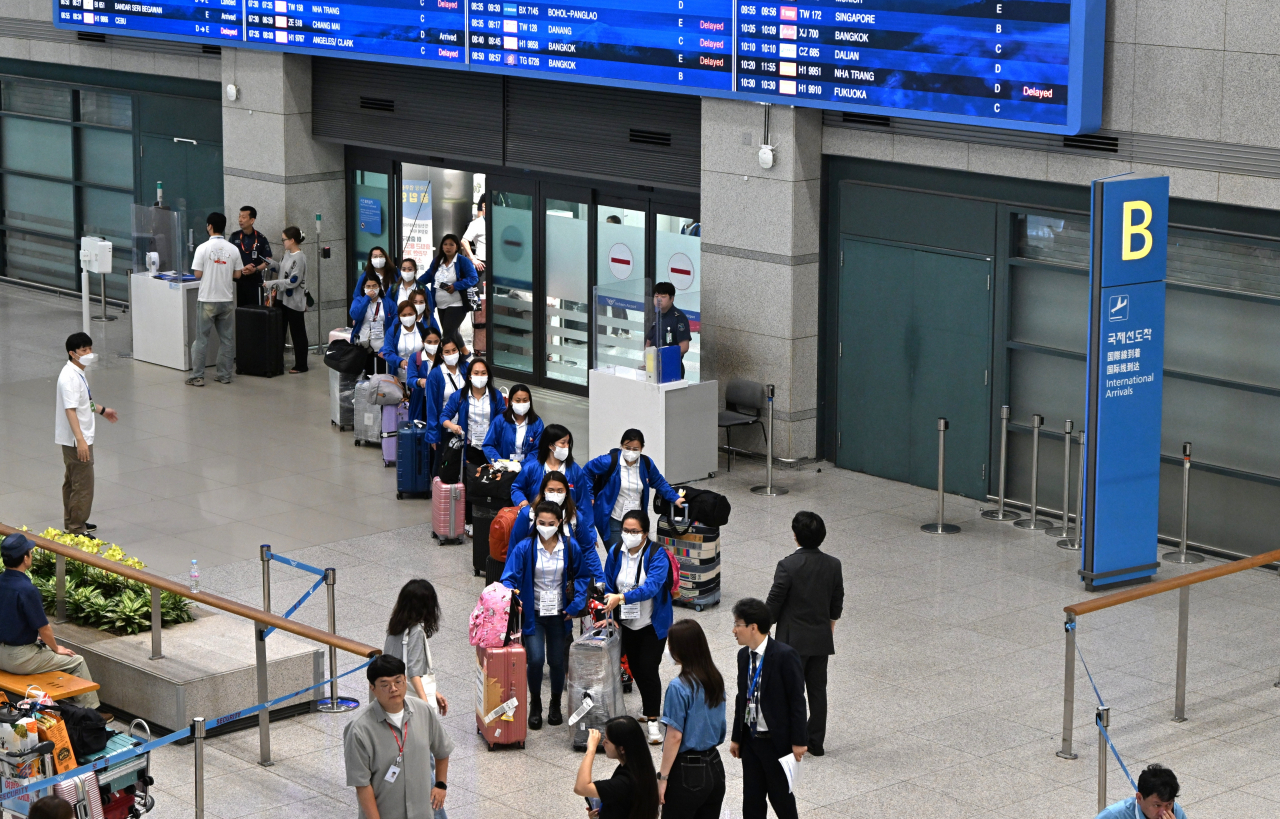 |
Filipina caregivers arrive at Incheon International Airport, Tuesday as part of the pilot project in which they will provide child care to local families. (Yonhap) |
Migrant rights organizations on Wednesday urged South Korea's government to implement measures to protect the rights of the 100 Filipina caregivers who arrived yesterday to undergo a month of training before being assigned to families in Seoul.
The Migrant Workers' Equality Coalition, a coalition of civic groups, emphasized that the lack of clarity in the caregivers' job responsibilities might lead to significant conflicts and potential exploitation, citing the ongoing ambiguities in their role as a major concern.
This ambiguity primarily arises from the pilot program referring to its workers as "caregivers" in English but as "gasagwallisa" -- "household managers" or "housekeepers" -- in Korean, creating confusion regarding their exact roles and responsibilities.
Seoul and Manila have reportedly been at odds for months over the scope of work for the Filipina child care workers taking part in the program. The Philippine government wants the caregivers to focus solely on child care, while Seoul wants them also to handle "light" household tasks, leading to ongoing disagreements and confusion.
After months of negotiations, both governments released an agreement last month.
According to the English-language agreement, caregivers are expected to provide "household management, as reasonably required for the personal needs of the children, such as dressing, bathing, and cleaning, toileting, and/or diapering, food preparation, cooking, eating, feeding, and cleanup" for the children and the pregnant member of the designated family.
An additional clause allows caregivers to perform "incidental and light household management activities for cohabiting family members, provided it does not exceed the duties specified" in the preapproved job description by the Ministry of Labor and Employment.
However, the coalition expressed concerns that the agreement still leaves significant room for potential misuse and exploitation of the workers. In light of these concerns, the coalition demanded that Seoul and Manila explicitly define the entire scope of the caregivers' work.
The "incidental and light household management activities" seem to include both cleaning and laundry for the children and pregnant woman in the family in their living quarters, as well as household management activities for cohabiting family members and other living quarters, which could lead to an excessive workload for the caregivers, the coalition pointed out.
In response to these growing concerns, the Seoul Metropolitan Government and the Ministry of Employment and Labor confirmed Wednesday the establishment of a tripartite management consultative group with representatives from the two government bodies to mediate grievances raised by the Filipina workers.
If serious problems such as sexual abuse or human rights violations occur, or if conflicts arise due to the ambiguous job responsibilities, mediation will be conducted through the consultative group, according to Seoul city government officials.
The Labor Ministry also recently stated, “The Filipina workers will perform the duties specified in the standard contract, and employers cannot arbitrarily assign additional tasks directly to the workers. We plan to clearly define the scope of work through the standard contract (which they will sign when they start working here)."
The coalition also raised concerns about the wages offered to the Filipina caregivers, noting that the legal hourly minimum wage of 9,860 won ($7.20) may be insufficient given Seoul's high living costs, with expenses such as food and transportation significantly reducing workers' take-home pay.
Some observers however argue that, compared to the average 2022 monthly salary of around 440,000 won in the Philippines, or 859,000 won a month for similar work in Hong Kong, or between 415,000 and 725,000 won a month in Singapore in 2023, the wages for these workers in South Korea are not low.
The Filipina caregivers in this six-month pilot program will receive the same minimum wage as South Korea's other employees, earning 1,190,000 won per month for a 4-hour workday and 2,380,000 won for an 8-hour workday.
Including the required four major insurances, employers will pay 13,700 won per hour, which some critics argue is burdensome for average households here.
The six-month pilot aims to evaluate the program's effectiveness in addressing the shortage of care workers for child care and related household management.
Exclusively hiring Philippine national women aged 24-38, the program runs from September 3, 2024 to the end of February 2025. The 100 Filipina caregivers, who arrived in Seoul on Tuesday, started a four-week training program to aid their transition and social integration here, concluding on September 2.







![[Today’s K-pop] Blackpink’s Jennie, Lisa invited to Coachella as solo acts](http://res.heraldm.com/phpwas/restmb_idxmake.php?idx=644&simg=/content/image/2024/11/21/20241121050099_0.jpg)